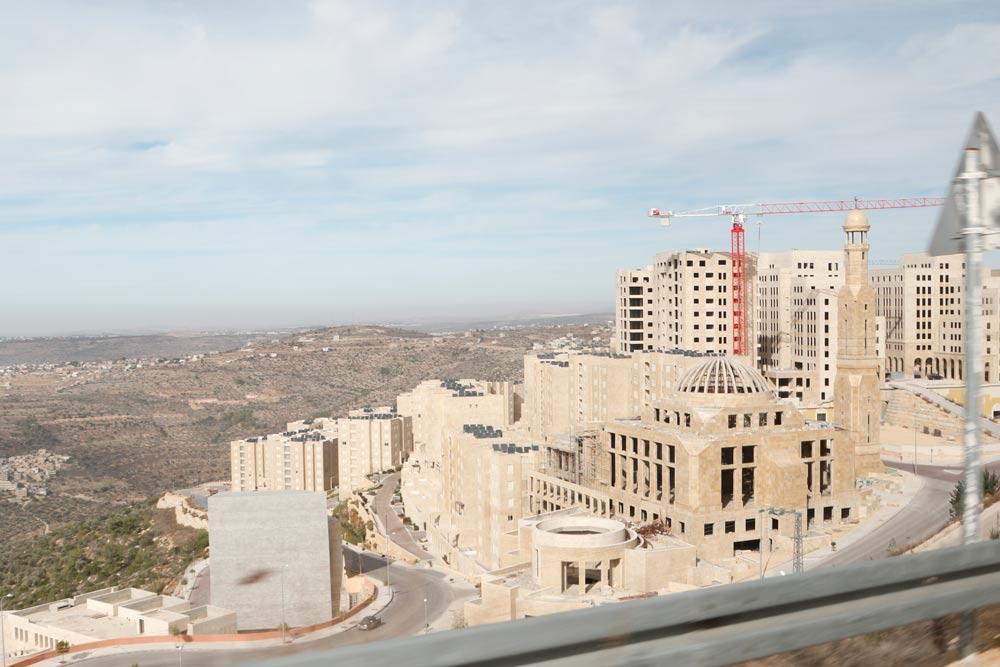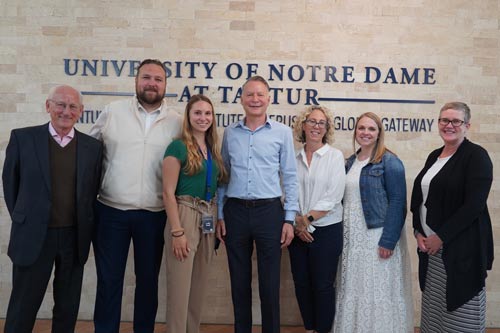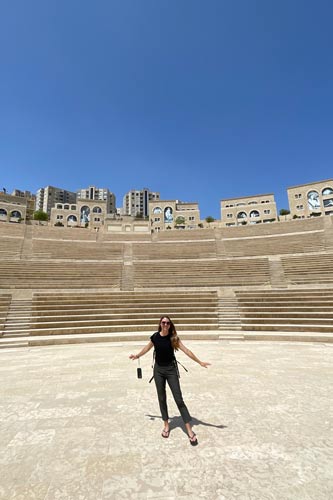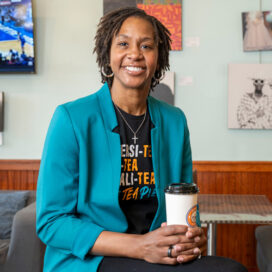Business in the Holy Land
Mendoza professors host conference in Jerusalem on ethical leadership
Published: September 12, 2023 / Author: Brendan O’Shaughnessy (ND '93)

Rawabi is the first planned city built for and by Palestinians in the West Bank, and is hailed as a “flagship Palestinian enterprise.” Rawabi is located near Birzeit and Ramallah. (Stock Image)
Built on a hilltop like Notre Dame’s Jerusalem Global Gateway, the city of Rawabi in the West Bank is the first planned city built by Palestinians for Palestinians.
Rawabi has high-end consumer shopping, luxury apartments and even a Roman amphitheater. What the $1.4 billion project doesn’t have is enough everyday residents and large businesses to fill it with the buzz of a thriving city. It still has plenty of potential to grow.
The challenge is that many people bought residences there as vacation homes. Lydia Knoll, a dual Notre Dame MBA and Keough School of Global Affairs graduate student at the University of Notre Dame, said it felt quiet on a Saturday morning visit this summer, with just a few children on a playground and not enough adults walking the pristine streets.
Devising strategies to realize the more expansive vision of Rawabi developer Bashar Masri, a Palestinian billionaire and the city’s founder, became the case study at the center of an international event held at Notre Dame’s Tantur campus in Jerusalem.

Mendoza College of Business faculty visit the University of Notre Dame at Tantur.
Faculty from the Mendoza College of Business and the Pulte Institute for Global Development developed the inaugural “Reimagining Business Excellence” program with the director of the Jerusalem Global Gateway, to bring together university experts with leaders and entrepreneurs who work and care for the Middle East and North Africa (MENA) region. The guided-learning curriculum focused on ethical business leadership.
“It’s a really interesting and important part of the world,” said Jessica McManus Warnell, one of the program organizers and the Rex and Alice A. Martin Faculty Director of the Notre Dame Deloitte Center for Ethical Leadership at Mendoza. “We read about it all the time, and it’s most often about the conflict. But there are so many innovative, hardworking people trying to make their corner of the world more peaceful and prosperous.”
Tantur (from the Arabic word meaning “hilltop”) is a 36-acre plot of land purchased by the Vatican and leased to Notre Dame to run an ecumenical center for Christian theological research and dialogue. Pope Paul VI asked Rev. Theodore Hesburgh, C.S.C., then the University president, to shepherd the project. Tantur’s complex origin is a story of its own, but the ecumenical institute finally opened in 1972 on a hill between Jerusalem and Bethlehem, strategically positioned to fulfill its mission of bridging faith communities.
Notre Dame undergraduates began arriving for study abroad programs in the 1980s, and Tantur developed a reputation as a convener for various groups over the decades, with most parties viewing it as neutral ground even though a border wall around Bethlehem in the 2000s made Palestinian access more difficult. It became the Jerusalem Global Gateway in 2014.
Still, the focus has been largely on theological and political research and dialogue. Daniel Schwake, the executive director at Tantur since 2019, brings a business background to the position and has cultivated partnerships with universities and other organizations in the region, which are starting to sprout after the pandemic interruption. The Jerusalem Global Gateway now offers new programs that leverage the distinct location and mission of the Tantur campus, including language studies, computer coding and ethical leadership.
Schwake came up with the idea of an executive education program at Tantur and invited McManus Warnell to organize the presentations with Kristen Collett-Schmitt, finance professor and the associate dean for innovation and inclusion at Mendoza College of Business, and Melissa Paulsen from Notre Dame’s Pulte Institute for Global Development. Georges Enderle, John T. Ryan Jr. Professor Emeritus of International Business Ethics at Mendoza, also taught in the program. Schwake identified Rawabi for the case study and recruited participants, while the faculty members focused on preparing the academic sessions.
“There are lessons on best practices in business and effective leadership that are universal and others that are context dependent,” McManus Warnell said. “The RBE program was an amazing opportunity to spend time with a diverse and engaged group of leaders from the region, exploring both.”
Convening people of different beliefs at Tantur — a place created to do just that — is not a simple task. Political sensitivities must be respected, Schwake said.
“It’s obviously a very challenging task to design a program that is as inclusive and diverse as the region is but that does not shy away from the conflict and injustice around us,” Schwake said. “I am grateful to all those brave leaders who joined our program. It was inspiring to be in the room with people who want their organizations to succeed, but they also clearly care for the larger societies in which they operate.”
He invited executives and experts from the region, Europe and the United States.
“I am humbled to see Notre Dame playing the role of both the expert as well as the convener,” he said. “We had people who came from businesses, a CEO of a company and executive directors of nonprofits. And people in different positions at either for-profit or nonprofit organizations, vice presidents from startups in the tech industry, and people on the development side. It was also a very mixed group in terms of nationalities.”
Schwake’s existing relationship with Masri made Rawabi a good case study. And it’s a massive and visionary project.
“We wanted to talk about a case where business and social responsibility questions really come together, and not in an artificial way,” Schwake said. “While you’re building a city that is supposed to make money for the developer, you have to also think about a lot of social responsibility questions — from voting rights to schools to building churches and mosques.”
Schwake also convened another Mendoza conference at Tantur this summer. Corey Angst, the Jack and Joan McGraw Family Collegiate Professor of IT, Analytics, and Operations, hosted an exploratory conference on the social impacts of online gaming in the MENA region.
The other link between the two conferences is Tim Schlindwein (BBA ’69), a Chicago investment manager, who provided funding for both events.
Schlindwein said his interest in Tantur happened “sort of back door.” About a decade ago, he went on a Notre Dame mission trip to the Holy Land, where he met people from Tel Aviv University and ended up on their board of governors. He then created an endowment to fund research collaborations between the two universities.
“Our family’s goal was to say: These are two wonderful universities. They’re large, broad and deep in terms of what they look at and where they go,” Schlindwein said. “If we can put something in place that brings these two cultures together and can sustain it, wouldn’t that be a good thing.”
Schlindwein said he was always hopeful that Mendoza would be involved, but he let people like Schwake and others set the agenda. “When I first stepped on Israeli soil, I thought I knew a little bit. But I look back now, and I’m embarrassed at what I didn’t know.” He said he hopes students will grow from this exposure as well.
 Lydia Knoll and Christian Montgomery (MBA ’23) said that was certainly the case. Knoll, the dual-degree graduate student, worked in Oregon for Adidas and came back to school for a more global perspective. She was invited to apply for funding for the RBE program because she crossed over the business and international perspectives, just like the organizing professors.
Lydia Knoll and Christian Montgomery (MBA ’23) said that was certainly the case. Knoll, the dual-degree graduate student, worked in Oregon for Adidas and came back to school for a more global perspective. She was invited to apply for funding for the RBE program because she crossed over the business and international perspectives, just like the organizing professors.
Her first trip to the Holy Land exceeded expectations. “I was anticipating the magnificence of some of the holy landmarks, and it was just as unbelievable as I thought it would be,” she said. “But there was an interesting juxtaposition of the landmarks with people trying to sell you tourist things.”
Knoll said the lectures were helpful as a preparation for the Rawabi case study, and the diverse ethnic and religious team groups were especially eye-opening. She concluded that working from a place of empathy is the only way forward.
“You don’t understand it until you’re in a room with people on all sides of that tension who are able to openly talk about it and share with each other how they’ve been treated,” Knoll said. “It’s so rooted in history, and if this has been happening for maybe 1,000 years, how do we get past this?”
For Montgomery, who earned his MBA in May, the highlight was presenting to Masri, the project developer. Throughout the conference, he said he had to stifle his American tendency to speak up and learn to just listen to unfamiliar perspectives.
“I’ve presented to professional athletes and coaches when I worked at Adidas, but a business mogul billionaire?” he said. “And he was taking notes. Usually, they have all the answers, but the fact that we made an impact was such a big deal.”
Schwake said Masri was complimentary of the faculty and students from Notre Dame. Collett-Schmitt, who oversaw the case study, said she appreciated the diverse teams Schwake gathered for the event.
“This experience was transformative for me, both personally and professionally,” she said.
“To see how open-minded, collaborative, intellectual and forward-thinking everyone was in a city that was rife with conflict was one of the best professional experiences of my life. Tantur is also incredibly peaceful — and charming — and I am inspired to get more of our Notre Dame and Mendoza communities there.”




